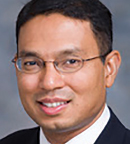
Aung Naing, MD, FACP
AT THE 2018 Society for Immunotherapy of Cancer (SITC) Annual Meeting, Aung Naing, MD, FACP, of the Department of Investigational Cancer Therapeutics at The University of Texas MD Anderson Cancer Center, Houston, commented on studies evaluating novel drugs to be combined with programmed cell death protein 1 (PD-1) inhibitors.
Although checkpoint inhibitors have been effective for treating solid tumors, some tumors have underlying immunologic profiles that make them less vulnerable, he explained. For example, (1) the tumor may be “hot” and sensitive to immunotherapeutics, but better response rate, more prolonged disease-free survival, and improved overall survival rates leave something to be desired; (2) the tumor may be “cold” and resistant, and their sensitivity to immune stimulation needs boosting; or (3) the tumor may be initially responsive but develops resistance to anti–PD-1/programmed cell death ligand 1 antibodies, and strategies to improve such secondary resistance need to be explored. Thus, understanding tumor biology and the microenvironment plays a significant role in making treatment decisions.1
Tumors possess many different receptors that could potentially be tapped to overcome these challenges, as described in early-phase studies at the SITC meeting. Drugs targeting TIM-3, LAG-3, and TIGIT, among other proteins and pathways, were shown to be safe and well tolerated and to have promising signs of activity in refractory populations.
“We also need to better understand the underlying mechanisms of response and resistance and to identify biomarkers for them that will help in patient selection and prevent inadvertent exposure to toxicities and increased heath-care costs in patients who are unlikely to benefit from these therapies,” Dr. Naing said. “In addition, we need to have a better understanding of why we are combining drugs and to determine the optimal means of doing so.” ■
DISCLOSURE: Dr. Naing is a consultant/advisor for Novartis, and CytomX Therapeutics; has received research funding from Bristol-Myers Squibb, Incyte, Novartis, Regeneron, Merck, National Cancer Institute, EMD Serono, MedImmune, Helios, Atterocor, Amplimmune, Armo BioSciences, Karyopharm Therapeutics, Pfizer, CytomX Therapeutics, Neon Therapeutics, Calithera Biosciences, and TopAlliance Biosciences (in addition to an immediate family member receiving research funding from Immune Deficiency Foundation); and has received reimbursement for travel/ accommodations/expenses from Armo BioSciences.
REFERENCE
1. Naing A: Being realistic and optimistic in curing cancer. J Immunother Precis Oncol 1:53-55, 2018.

